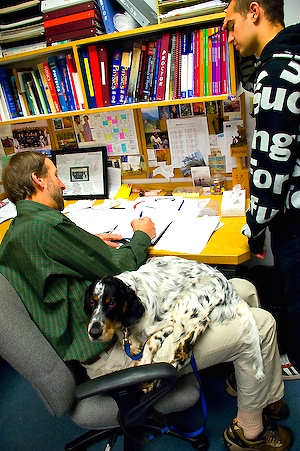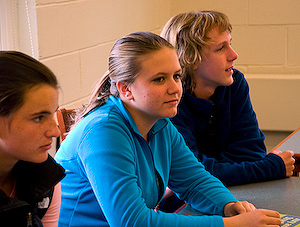In June, 1948, the
New Yorker magazine published a stunning, upsetting short story by an aspiring author named Shirley Jackson that rocked American literary society with intrigue, horror and disgust. Hundreds of readers cancelled their subscriptions, and the author was berated in her home town of Bennington, Vermont. With time, however, "The Lottery" gained huge acclaim for accomplishing something that all great art seeks: change. These Intro to Lit students are playing the roles of town leaders assessing a debate over the validity of ritual sacrifice to ensure future harvests.
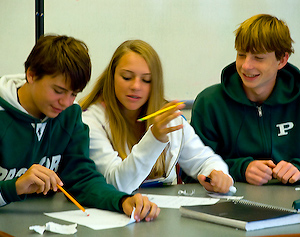
Shirley Jackson struggled to validate the mean, dark realities of her story, but did offer this: "I hoped, by setting a particularly brutal ancient rite in the present and in my own village, to shock the story's readers with a graphic dramatization of the pointless violence and general inhumanity in their own lives." The debate continues in Intro to Literature:
Ethical growth....the development of values with which we can live--both as individuals and as a community--comes in many forms and exercises. These students are jokingly submitting bribes to the Town Council!
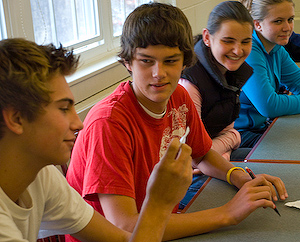
This leads to a different, yet related, topic. This week, members of Proctor Environmental Action took the risk of declaring a two week period during which the community will go without trays in the dining room. The purpose is to monitor the effect on food waste, numbers of glasses that need to be washed, and overall behavior. Several schools and colleges have taken the step.
This is geometry:

For the majority, I am sure, this experiment is inconvenient, but OK. Our dining room isn't necessarily suited to tray-less service, but maybe changes can be made. It's just a temporary study, after all. This is the same geometry class:
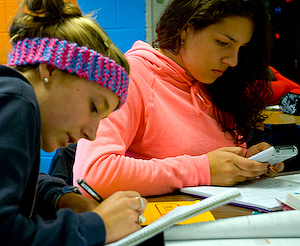
The debate about trays is healthy and lively. Kids informed by other schools' experience are charged and excited, and kids inconvenienced by the need to adapt (balancing a plate, silverware, and as many glasses as possible) are grumpy.
This is an AP Bio presentation:
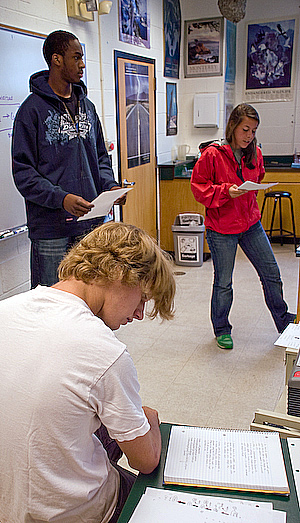
When we communicate our differences face-to-face, we have the luxury of reading social cues...those subtle nuances that let us know that everything is OK as we differ. It turns, out--however--that email communication is a poor vehicle for communicating disagreement. Our NEWS bulletin board became the venue for much overheated exchange over the last two days. Verbal stones were thrown over the issue of trays in the dining room.
Geometry:

This is a community that holds every member to ethical standards that are rare in 21st Century America. Despite all the informality and fun we enjoy, there exist codes that demand honesty, respect, compassion and responsibility of all. Walking through the community, visitors remark at the evident presence of these codes internalized in the students they see and meet.
These students are demonstrating a proof of the Krebs Cycle in AP Bio:
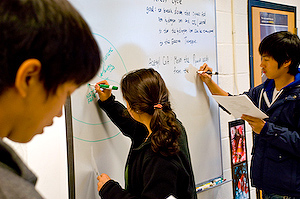
Our challenge--at the moment--is to remember that an email bulletin board is faceless, inviting irresponsible slights that we would never articulate in the face-to-face world at which Proctor excels as a human community. It is too easy to pick up stones and throw them, to preserve a tradition we have known.... a tradition with which we are comfortable.
During advisory, Patty's group uses a griddle to make breakfast burritos....
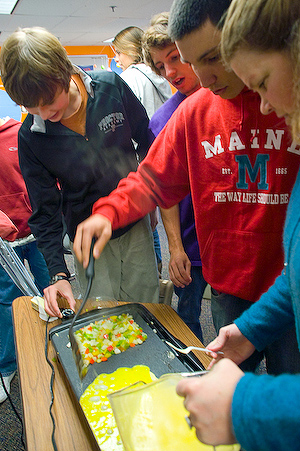
Even when protected by the invisibility of electronic communication, we need to be true to our selves...true to the values that distinguish us. Dougo gives extra help with his puppy in his lap:
